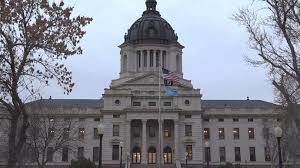
By Dana Hess
For the S.D. Newspaper Association
BROOKINGS — Two measures on the Nov. 6 ballot would make changes to the way the state’s constitution is amended.
Amendment X would change the threshold for approving an amendment, raising it from a majority vote to 55 percent of the votes cast. Amendment Z would require that each constitutional amendment be limited to a single subject.
The bill that grew into Amendment X was championed in the Legislature by Sen. Jim Bolin, R-Canton, who said that the state’s constitution is of such importance that it should take more than a majority vote to approve amendments.
“This is our foundational document,” Bolin said. “It shouldn’t be changed in a willy-nilly fashion.”
The amendment was endorsed on an 11-2 vote by a task force that studied ballot issues in the summer of 2017. The task force included lawmakers from both parties as well as representatives of municipalities, county commissions, the board of elections and county auditors.
Sen. Reynold Nesiba, D-Sioux Falls, served on the task force and is spearheading the effort against Amendment X.
Amendment X “assumes that the constitution is too easy to change already,” Nesiba said. “It’s not.”
Nesiba said that 26,000 valid signatures are needed to get on the ballot. In reality, to hit that number, close to 50,000 signatures have to collected. As an example, Nesiba noted two groups that tried to get amendments on this November’s ballot. One collected 33,000 signatures and the other collected 37,000. Neither made it on the ballot.
Bolin points out that Amendment X has nothing to do with ballot access.
Amendment X is patterned after a proposal that was approved by Colorado voters in 2016. Florida has a 60 percent threshold and New Hampshire’s original constitution, written in 1783, requires a two-thirds majority to pass an amendment.
“We’re not breaking any new ground here, at all,” Bolin said.
It’s well-trod ground, though, according to Nesiba with 240 amendments proposed in the state’s history. Of those, 224 were put on the ballot by the Legislature and 16 were initiated by citizens.
From statehood through the last election, 51 percent of all amendments were approved by voters with just six of the citizen-initiated measures becoming part of the constitution.
“Citizens aren’t doing this,” Nesiba said. “Amendment X is another one coming from the Legislature.”
Amendment Z also started in the Legislature, championed by Speaker of the House Mark Mickelson, R-Sioux Falls.
Keeping constitutional amendments to a single subject, according to Mickelson, will keep voters from having to face a decision about voting for a measure because it has some good qualities, but having to accept its bad ideas as well.
“It makes it clear to the voter what they’re voting on,” Mickelson said. “This makes the constitution less able to be abused.”
It’s the voters who are being abused, according to Rebecca Terk, a lobbyist for Dakota Rural Action. Terk said both Amendments X and Z seems to be aimed at the notion that too many wealthy, out-of-state interests are crowding South Dakota’s ballot.
“They’re wealthy,” Terk said. “They have the tools to overcome the hurdles in their path.”
According to Mickelson, rules that allow citizens to put amendments on the ballot were put in place to help people who didn’t think that lawmakers in Pierre were listening to their concerns. Those lawmakers weren’t listening to Mickelson in the last session, so he spearheaded efforts to put an increased tobacco tax and a ban on out-of-state contributions to ballot measure committees on this year’s ballot.
“I couldn’t get those through the Legislature,” Mickelson said, “but the people want these. That’s a healthy process.”
Terk isn’t buying the idea that the constitution needs a higher vote threshold or simpler topics on which to vote. But, like Mickelson, she’s putting her faith in voters.
“South Dakota voters are not dumb,” Terk said. “They take the time to really understand what’s on their ballot.”
